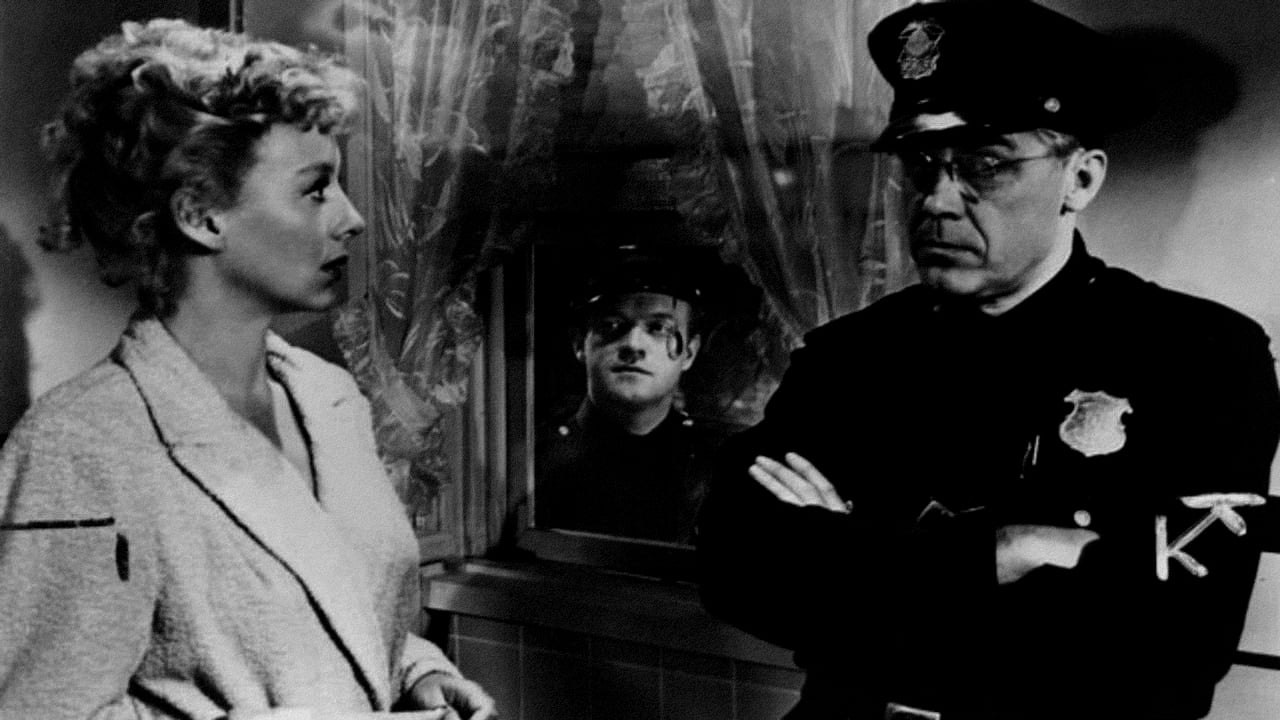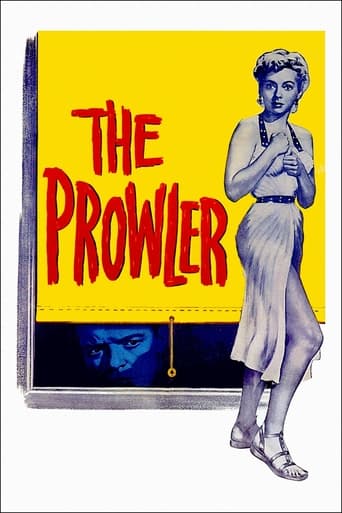



It's an amazing and heartbreaking story.
Go in cold, and you're likely to emerge with your blood boiling. This has to be seen to be believed.
View MoreThe first must-see film of the year.
After playing with our expectations, this turns out to be a very different sort of film.
View MoreNoir of exceptional quality. Plot is driven by acquisition. Female lead (Evelyn Keyes) wants a baby and male lead (Van Heflin) wants a motel. This is Losey's party and I love how he uses a baby to bring down the house of cards that was built by Van Heflin. Many baby conceptions are inconvenient, but this one opened the door for Karma to come in and do it's work.
View MoreThe infamous Hollywood blacklist, which saw writers, actors and directors alike accused of harbouring Communist sympathies and forced others to name names or else face exile from the business altogether, may have been one of the darkest times the industry has ever faced. Yet, it also inspired great anger in the movies, and writers and directors channelled this frustration into some of the best movies of the era, taking the opportunity to delve into and pick apart the underbelly of the so-called perfect American society. Director Joseph Losey and screenwriter Dalton Trumbo - the latter already on the blacklist and working under a pseudonym - combined to create one of the darkest and most fascinating film noirs ever to come out of Hollywood with the inexplicably obscure The Prowler.After seeing a strange man lurking in the backyard of her hacienda, Susan Gilvray (Evelyn Keyes), the wife of a radio personality, calls the cops and is greeted by partners Webb Garwood (Van Heflin) and Bud Crocker (John Maxwell). It's a routine visit, but Webb falls for the striking Susan, and is soon back to pay her a follow-up call in the hope of seducing her while her husband is at work. The two start a passionate and dangerous affair, but Webb becomes frustrated as Susan cannot bring herself to leave her husband. Retreating to his squalid, cramped apartment, Webb ignores Susan's calls while hatching a 'perfect crime' - to become a prowler himself and take out the man standing in his way of happiness in the process. But there's no such thing as a perfect crime in the world of noir, and the couple are soon under suspicion and on the run.One of the key aspects to the film noir genre is the idea of the femme fatale - the beautiful blonde or brunette who, frustrated and bored with their current situation, start to manipulate events with devastating results, and usually duping some poor love-struck sap in the process. The Prowler is in many ways incredibly similar to Billy Wilder's masterwork Double Indemnity, but with the gender roles reversed. Here, it is Van Heflin's Webb Garwood who is the schemer, and he does so with such arrogant relish that I found myself almost willing him on. The cogs start turning the moments he lays eyes on Susan, and they turn ever faster when he takes a peek at her husband's generous will. He is a truly hideous, wretched creation, played with incredible naturalism by Heflin. The devious intentions glisten in his eyes from the moment he turns up at Susan's house for the first time alone.Trumbo, who produced some of his greatest work while on the blacklist (and winning two Oscars), clearly enjoyed dissecting a trusted American institution and showing its ugly side. It's shocking to see Webb, a police officer often in uniform, act with such malicious intent in a time when America was still promoting the idea of the 'American Dream'. Webb knows what his dream is and goes about taking it with all his might, mirroring the proud capitalist ideals of his country. It's incredibly subversive stuff for the genre, and is even bold enough to let Susan, an adulterer carrying a child conceived out of wedlock, off relatively easy for her sins. It's a miracle it got past the Hays Code, and its somewhat taboo subject matter and the matter-of-fact way in which it goes about its business is probably why it isn't better known. Yet this deserves to find a new audience, as on top of being one of the most intriguing film noirs out there, it's also significant both historically and culturally.
View MoreLonely housewife Susan Gilvray calls the police when she thinks she sees a prowler outside her bathroom window late one night; her husband works as a late night radio presenter and thus she is alone. The police check it out and can do very little but one of them, Webb Garwood, returns later that night to "check in on her". Finding common ground with her, they share a few more evenings of "checking in" as a relationship grows between them. Eventually the pressure builds on Susan to divorce her husband but this poses all sorts of problems and Webb starts planning alternatives.I watched this film without knowing much about it beyond the title; so when the main characters are introduced I really didn't even know if they were the main characters or not, or where the film was going with them. Part of the reason I felt like this was that I didn't think the characters worked and I couldn't get into the relationship between them. From the very start Webb is really creepily overly familiar and pushy and he is this way to the point that I didn't believe that Susan would let him stay in the house. This continued across the whole first half of the film and I never really believed it. Webb occasionally is friendly and normal but as a character he really doesn't have the charisma to sell this intrusion and rapid affair. The character of Susan sort of helps because she is timid, lonely and slightly nervous – so as a dynamic maybe this is why such a pushy guy would make inroads as he does.The plot gradual turns to darker twists but even at this point I didn't buy it. The actions and motivations of the characters felt like things that were written rather than things that these characters would really do – in particular some of the bigger plot points felt like a matter of moving the story along. The second half is a bit better because events drive the narrative and as such these engage more easily, but it was a shame that the first half was weak because this is the core of the film. The two-hander with Heflin and Keyes should have been as thrilling as the later events but the writing of the characters don't give them the material to work with and neither really nail the relationship dynamics between their characters.This is the problem with the film and it is one that it never escapes. The central relationship never feels convincing and because this is where all the events stem from, they are built on weak foundations. The events of the second half provide some interest and pace but generally it is not a great film thanks to it not getting the basics right from the start.
View MoreThis one isn't around very often on television. I don't know why. It's a pretty good noir, in its own slightly screwy way. When we think of noir, we tend to think of some big dumb brute like Robert Mitchum being manipulated by a scheming woman. Here it's the other way around.Evelyn Keyes is a bored housewife whose husband is an all-night disk jockey in a thinly disguised Los Angeles. She reports a prowler one night and temptation knocks on the door in the form of police officer Van Heflin. Heflin smirks a lot but he seems to ignite Keyes and soon they are boffing each other while Keyes' elderly hubby is spinning records on the radio. She was unfulfilled before, her husband being impotent, but she's no long unfulfilled and falls in love with Heflin.I don't think I want to give away much more of the plot because this is one of those instances in which an inexpensively made movie actually has some unpredictable elements in it.Making this film must have been fascinating, in one way or another, for everyone involved. A middle-aged guy, John Maxwell, great name, pats his wife on the rump. Don't know how that made it past the gate. And the House Unamerican Activities committee was hitting its stride, of course. Joseph Losey, the director, simply gave up and moved permanently to England where he turned out some seriously perverted masterpieces like "The Servant" and some engaging whimsy like "Modesty Blaise." The writer Dalton Trumbo was blacklisted but continued working. Here he appears under the nom de plume "Hugo Butler," the name of a good friend of his.The producer, S. P. Eagle (aka Sam Spiegel) threw an expensive wrap party and asked everyone to chip in for it. But he'd worked the party into the budget, so he just pocketed everyone's contributions and walked away with the money. As Heflin's character says in a desperate attempt at self justification -- everybody is a little crooked, from bankers to grocery store owners. He could have added movie producers.I suppose it's possible to read communist propaganda into this movie. Movies cover a lot of ground and, like the Bible or the Constitution, you can pretty much find anything you're interested in finding. Why, for instance, did Heflin have to use bankers as one of several examples of crooked businessmen? True, Trumbo's lines did include grocery store owners and a couple of other working-class types but still -- bankers? Why cast such aspersions? Everyone knows bankers and brokers never cheat. And not just bankers. The protagonist is a greedy, murdering cop. Everyone knows cops are there to serve and to protect us. But there's your commie pinko talking for you, polluting our precious bodily fluids.Evelyn Keyes was just getting divorced from John Huston at the time this was shot, and her father-in-law, Walter Huston, had just died. That may account for the uneasy quality of her performance. She seems breathless and she trembles throughout. Van Heflin turns in a nice performance. His lies sounded very convincing, to me as well as to the object of his affection. And there are moments when he actually makes us feel sorry for him. But, honestly, wiliness and guile are not his shtik. He's better at straightforward villainy ("They Came to Cordura") and he was excellent as the simple but not unperceptive squatter in "Shane." The sets are minimal and uniformly bleak. The big "hacienda" that the wealthy Keyes lives in looks spare and barren. And Heflin's cop lives in what I guess is called a studio apartment and what I'm sure would be called a dump. Joe Friday was never this badly off.
View More